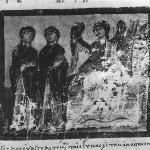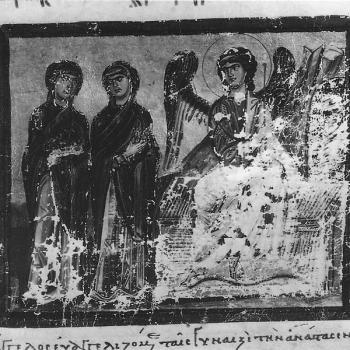May is Mental Health Awareness Month. This means during the month of May, we should pay special attention to fostering mental health among congregations and fellow Christians. While the past few years have inspired many great conversations about mental health, we can always do more to end the stigma surrounding it. When people experience mental health episodes (whether ongoing or periodic), there’s no shame in getting help. The more we discuss mental health in a healthy way, the better we, as Christians can be, in offering spiritual assistance and encouragement to those who strive for better health.
Here we will look at five Biblical figures whose stories suggest they experienced different encounters with mental health. A note: as mental health wasn’t widely recognized in the ancient world, it’s impossible to diagnose any Biblical individual with certainty. We’re basing the info presented on what we do know, and helping to continue important conversations about mental health.

Hannah
Once when they had finished eating and drinking in Shiloh, Hannah stood up. Now Eli the priest was sitting on his chair by the doorpost of the Lord’s house. In her deep anguish Hannah prayed to the Lord, weeping bitterly…As she kept on praying to the Lord, Eli observed her mouth. Hannah was praying in her heart, and her lips were moving but her voice was not heard. Eli thought she was drunk and said to her, “How long are you going to stay drunk? Put away your wine.”
Not so, my lord,” Hannah replied, “I am a woman who is deeply troubled. I have not been drinking wine or beer; I was pouring out my soul to the Lord. 16 Do not take your servant for a wicked woman; I have been praying here out of my great anguish and grief.” (1 Samuel 1:9-10, 12-16, NIV)
One could say Hannah showed signs of long-term depression. From what we know of her story, she lived with the taunts of Peninnah, the other wife she shared with Elkanah, her husband. Even though she was the favored wife, Hannah didn’t have any children…while Peninnah had multiple. Feeling incomplete and void, Hannah longed for a child of her own. Year after year, she experienced emotional anguish.
Whether Hannah experienced depression again after she became a mother is unknown. What we can see, however, is that when we deal with emotional and mental anguish, God hears.
Saul
Saul said to his armor-bearer, “Draw your sword and run me through, or these uncircumcised fellows will come and run me through and abuse me.”
But his armor-bearer was terrified and would not do it; so Saul took his own sword and fell on it. When the armor-bearer saw that Saul was dead, he too fell on his sword and died with him. So Saul and his three sons and his armor-bearer and all his men died together that same day. (1 Samuel 31:4-6, NIV)
King Saul’s mental health is an interesting study. He appears to have suffered from extreme mood swings and hallucinations. Some have suggested he might have suffered from bipolar disorder, depression, delusional disorder, or Post Traumatic Stress Disorder (from fighting in battles for so many years). Whatever it was, it deeply impacted his life, especially the longer he ruled Israel as king. Though a great warrior (and no punk in the leadership area) for most of his reign, Saul’s eventual battles with mental health plagued him until he committed suicide.
Elijah
Elijah was afraid and ran for his life. When he came to Beersheba in Judah, he left his servant there, while he himself went a day’s journey into the wilderness. He came to a broom bush, sat down under it and prayed that he might die. “I have had enough, Lord,” he said. “Take my life; I am no better than my ancestors.” Then he lay down under the bush and fell asleep.
All at once an angel touched him and said, “Get up and eat.” He looked around, and there by his head was some bread baked over hot coals, and a jar of water. He ate and drank and then lay down again.
The angel of the Lord came back a second time and touched him and said, “Get up and eat, for the journey is too much for you.” So he got up and ate and drank. Strengthened by that food, he traveled forty days and forty nights until he reached Horeb, the mountain of God. There he went into a cave and spent the night. (1 Kings 19:3-9, NIV)
Elijah’s prophetic ministry is one of the best known in the Old Testament. He went from having the biggest bonfire of the year, proving His God was better than the others, to hiding in a cave. He was so intimidated by the threats of Jezebel, he grew depressed to the point where he wanted to die.
God gave him a nap and a snack. This reminds anyone who experiences issues with mental health of the need to both rest and eat properly, even if you don’t feel like doing so. The story also bespeaks understanding that sometimes no matter how incredible it is to do things for the Lord, sometimes such can be draining.
Jonah
Jonah had gone out and sat down at a place east of the city. There he made himself a shelter, sat in its shade and waited to see what would happen to the city. Then the Lord God provided a leafy plant and made it grow up over Jonah to give shade for his head to ease his discomfort, and Jonah was very happy about the plant. But at dawn the next day God provided a worm, which chewed the plant so that it withered. When the sun rose, God provided a scorching east wind, and the sun blazed on Jonah’s head so that he grew faint. He wanted to die, and said, “It would be better for me to die than to live.”
But God said to Jonah, “Is it right for you to be angry about the plant?”
“It is,” he said. “And I’m so angry I wish I were dead.” (Jonah 4:5-9, NIV)
Jonah’s story is an interesting one in Scripture. Here we have a prophet who was upset that his ministry was effective! After disobeying God, coming to the end of himself in the belly of a large fish. Upon completing the assignment, Jonah still waited for Nineveh to be destroyed. Not only was he depressed, he wanted to die.
Ministry can be a challenging experience, especially for the minister. Even in the midst of our successes, we may still feel empty or challenged about divine assignments. Jonah proves the need for ministerial perspective. Mental health can exaggerate the way we see things, so it’s always beneficial to see things from a divine perspective.
Jesus
Jesus went out as usual to the Mount of Olives, and His disciples followed Him. On reaching the place, He said to them, “Pray that you will not fall into temptation.” He withdrew about a stone’s throw beyond them, knelt down and prayed, “Father, if you are willing, take this cup from Me; yet not My will, but Yours be done.” An angel from heaven appeared to Him and strengthened Him. And being in anguish, He prayed more earnestly, and His sweat was like drops of blood falling to the ground. (Luke 22:39-44, NIV)
The fact that Jesus experienced such extreme anxiety proves mental health episodes aren’t sinful. It proves such is often part of the human experience. Rather than judging mental health, we should do what we can to help promote better health as Christian believers.
How can you promote better mental health?
If there’s only one takeaway from this look at Biblical mental health, it’s that results can widely vary. It’s essential that, as spiritual people, we offer support for those who seek better mental health. Whether through counseling, medication, therapy, spiritual support, or other means, better mental health begins when we erase stigmas surrounding it. How can you promote better mental health in your congregation?














